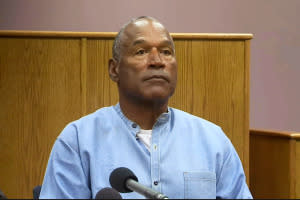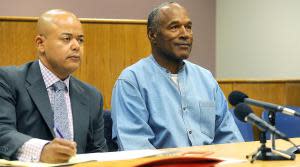O.J. Simpson, Now 70, Granted Parole from Prison Nearly 9 Years After Conviction in Vegas Robbery
O.J. Simpson — the football Hall of Famer and former NFL star, Hollywood actor and double-murder suspect — was granted parole on Thursday, nearly nine years after he was sentenced for his role in an armed robbery at a Las Vegas hotel.
In ruling unanimously for his early release, the four Nevada parole board commissioners present referenced both the support that Simpson has from his family and his disciplinary-free record while behind bars, where he also took anti-violence classes.
Though he will be paroled, Simpson, 70, will be subject to supervision by the state. He faces several possible restrictions on his behavior, including on drinking alcohol, owning weapons and with whom he can associate.
When he learned he would be set free, he said, “Thank you, thank you,” and exhaled deeply before he was seen raising his hands over his head as he walked back to his cell. He said, “Oh, God, oh!”
His parole will expire when his prison term was set to end, on Sept. 29, 2022. He said he would like to live in Florida after prison and he is now set to be released as early as October, a month that has become a crossroads of his life.
He was found guilty on Oct. 3, 2008, of various felony charges including kidnapping and robbery in connection with the Vegas altercation. That conviction came 13 years to the day after he was found not guilty of murdering his ex-wife Nicole Brown Simpson and her friend Ron Goldman in Los Angeles in 1994 — an acquittal that itself came after an eight-month trial which consumed the country.

Dressed in blue short-sleeves and jeans, Simpson spoke at length in his defense at the hearing on Thursday, which began at 10 a.m. local time. In an unusual move reflecting his notoriety, the hearing was live-streamed online and broadcast on ESPN.
Simpson appeared fit, relaxed and voluble, regularly cracking wise to laughter from other attendees. At times he showed flashes of the force of personality, even aggression, that helped make him famous — and then infamous.
When the board chairwoman mistakenly referred to him as 90 years old, he jokingly responded, “I feel like it, though.”
Though he was adamant — again — in his explanation of the robbery that landed him in prison, reiterating that he was not armed and was only seeking to reclaim his own property, Simpson also stressed that he wasn’t excusing himself.
“I’ve spent nine years making no excuses about anything,” he told the parole board in his closing remarks. “I am sorry that things turned out the way they did. I had no intent to commit a crime.” (One of the commissioners, Tony Corda, noted during questioning that Simpson’s explanation “differs a little from the official record.”)
“I’m sorry it happened. I’m sorry, Nevada,” Simpson said. “I thought I was glad to get my stuff back, but it just wasn’t worth it.”
“I’ve done my time,” he said. “I’ve done it as well and as respectfully as anybody can. … I’ve not complained for nine years, all I’ve done is try to be helpful” and encourage other prisoners to do their time and fight in court, not behind bars, he said.
Simpson was accompanied by his attorney, Malcolm LaVergne. His sister Shirley Baker, daughter Arnelle Simpson and friend Tom Scotto were also in attendance. Baker wept and hugged her niece as Simpson heard he would get parole.
“No one really knows how much we have been through, this ordeal in the last nine years,” Simpson’s daughter told the board, reading from a statement, before pausing to gather herself.
“My experience with him is that he’s like my best friend and my rock,” she continued. “And as a family, we recognize that he is not the perfect man, but he’s clearly a man and a father. He has done his best to behave in a way that speaks to his overall nature and character, which is always to be positive no matter what.”

Speaking to PEOPLE before a decision had been made about Simpson’s parole, Nicole Brown Simpson’s sister Tanya Brown said she had “learned to accept things that I cannot change or have control of.”
“This issue is one of those instances,” she said. “Whatever the verdict of the parole hearing will be, under Nevada state law — released or not — the law was granted.”
After learning he would be freed, she said, “I will continue to still live my life as I have been doing for 23 years.”
Ron Goldman’s family has repeatedly expressed their misgivings about Simpson’s early release, saying in a statement this week that they felt “frustration and anticipation over how this will change their lives again.”
• Want to keep up with the latest crime coverage? Click here to get breaking crime news, ongoing trial coverage and details of intriguing unsolved cases in the True Crime Newsletter.
Among other information that the parole board considered was Simpson’s pre-sentence investigation following his conviction and a report from the state’s department of corrections about his time in prison.
Simpson has previously appeared before the board after being convicted in 2008. He was granted parole on some of his charges in 2013, and observers had said he was well-positioned to be granted parole on the remaining counts heading into this week’s hearing, where he was questioned by four of the board’s seven commissioners.
Simpson’s parole hearing was discretionary — not mandatory — but included a review of multiple factors which appeared to favor him, including his age at the time of his first arrest, his employment history before being taken into custody and his behavior while incarcerated.
Current Clark County District Attorney Steven Wolfson tells PEOPLE he wasn’t surprised that the board granted Simpson parole.”It was really his to lose,” he says. “He didn’t blow it.”
Like others, though, he says he was struck by Simpson’s tone, which could have blown it for him if he didn’t have such a low risk-assessment score.
“There was very little remorse shown,” says Wolfson, who did not prosecute the 2008 case but is married to Judge Jackie Glass, who presided over it. “He seemed agitated by the first commissioner. He should have been more soft-spoken and contrite – and shorter.”
Bruce Fromong, one of the two memorabilia dealers who was robbed by Simpson, attended Thursday’s hearing, where he said that Simpson had never threatened him with a gun and that Simpson remained his friend.
“On that day [of the robbery], I felt that Mr. Simpson was misguided,” Fromong said.
The other victim, Alfred Beardsley, died in 2015.

The Case So Far
Simpson was arrested on Sept. 16, 2007, only three days after authorities said he and five other men went to a Las Vegas hotel to rob two sports memorabilia dealers.
The victims, Beardsley and Fromong, were led to believe a prospective buyer was coming to their casino hotel room to browse their goods, many of them connected with the legendary Heisman trophy winner.
Instead, authorities said, Simpson and his associates, two of whom were armed, rushed into the room, stuffed the memorabilia into pillowcases and fled — though, as Simpson said at his parole hearing, some of the memorabilia at the hotel was in fact his.
Four of the men who accompanied Simpson in the robbery accepted plea deals and testified against him at trial. The fifth man was convicted alongside Simpson, but an appellate court later granted him a new trial and was released after agreeing to a plea deal.
Simpson’s defense argued that he was not armed at the time and did not know two of the other men brought weapons, though one of them testified that he did so at Simpson’s behest. A jury convicted him on 12 counts.
“We don’t want people going into rooms to take property,” David Roger, then the lead prosecutor, said at the time. “That is robbery. You don’t go in and get a gun and demand property from people.”
Simpson mounted an unsuccessful appeal after his conviction and then largely retreated from view during his incarceration, not appearing in public again until May 2013.
“I never meant to hurt anybody,” he said at his sentencing in December 2008. But presiding Judge Glass was not moved.
“Earlier in this case,” she said, “I said to Mr. Simpson I didn’t know if he was arrogant or ignorant or both … I got this answer, and it was both.”
• With HOWARD BREUER, BILL HEWITT and STEPHEN M. SILVERMAN
